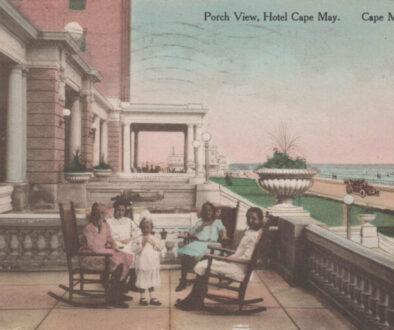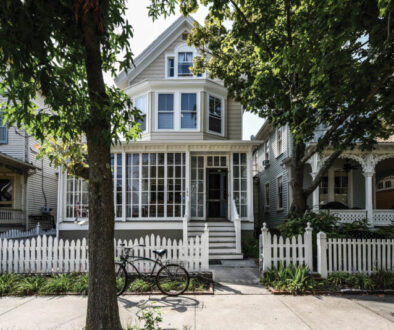MAC Museum Shops

capemaymac.org
When visitors purchase an item at Cape May MAC museum shops, they’re doing more than bringing a souvenir home—they are supporting history in Cape May.
Cape May MAC (Museums. Arts. Culture. is a multi-faceted non-profit organization that promotes the restoration, interpretation, and cultural enrichment of the Cape May region for its residents and visitors. The organization maintains and operates the Emlen Physick Estate, the Cape May Lighthouse, and the World War II Lookout Tower, and it has helped transform Cape May from a summer-only beach resort to a historic destination.
Sharon Falkowski, director of retail operations, oversees the Museum Shops at all three locations. With a career background in advertising and marketing, Falkowski has spent the last seven years at the helm of MAC’s retail operations, where she searches for and stocks the shelves with unique items that enhance and extend a guest’s visit.
The Carriage House is an 1876 structure on the grounds of the Emlen Physick Estate. It was built for the original owner Dr. Physick’s horses and carriages, and he lived in the building while construction on his main home was being completed. The carriages, horses, and hay are gone, and in their place is the Carriage House Museum Shop, the Carroll Gallery, and Vintage, Cape May MAC’s restaurant operated by KARA Restaurant Group.

Given that the Carriage House once operated as a Twinings tea room and the great importance of tea time in Victorian-era Cape May, Falkowski likes to pay homage to that history by offering an array of Roy Kirkham and Delton teapots and Harney & Sons Fine Teas.
The Carriage House has a wide variety of books on local subjects from Arcadia Publishing. One of the most popular titles is Victorian Cape May by Robert Heinly, who explores WHAT life was like in that era. The Carriage House also carries a number of notable Victorian-era titles via Dover Publishing from authors such as Charles Dickens, Sir Arthur Conan Doyle, and Mary Shelley. Fans of the paranormal can find several books that focus on Cape May’s spookier side, and other titles explore the history of slavery in New Jersey and Cape May’s role in the Underground Railroad.
The little ones aren’t left out. For children, the Carriage House carries items from eeBoo, an eco-friendly toy manufacturing company in New York, such as young reader books, tea party sets, and puzzles.
Whenever possible, Falkowski aims to stock the museum shops with items that are locally made or produced in the United States, sustainably manufactured, and minority owned. The shop recently brought in locally designed tea towels and tote bags that are screen printed in town at Flying Fish Studio. They also carry local sea glass jewelry from Cathy Smith, ornaments by local artist John Bailey, and handmade soaps by Shore Soaps.
“We see a lot of repeat visitors during Christmas and holidays,” said Falkowski. “One woman makes a special trip to buy Harney & Sons Paris tea for her friends and family. I always make sure to have enough containers for her, and while she could make her purchase online, she tells me that it just isn’t the same unless she makes the trip in person.”
Falkowski tries to carry items that complement the current exhibit at the Carroll Gallery. The present one, running until the end of April 2022, is “A Diamond of Their Own: The Remarkable History of the Negro Leagues as portrayed by artist Sydnei SmithJordan.”
“We have a wide variety of prints from the featured artist SmithJordan and artist Chanelle René, as well as books on the subject, such as Curveball by Toni Stone,” she said.
Lighthouse Museum Shop
The Cape May Lighthouse was built in 1859, was automated in 1946, and continues operation to this day. Since it opened to the public in 1988, more than 2.5 million people have climbed the 199 steps to the Watch Gallery at the top. A number of those visitors also make a stop in the Lighthouse Museum Shop, which is in what used to be the oil house. Falkowski says that while the shop is smaller in size than the Carriage House, it has more retail sales. Items in this shop are nautically themed and carry souvenirs that have the popular lighthouse image.
Falkowski notes that one of the most popular items are t-shirts proclaiming that the wearer “Climbed the Cape May Lighthouse.”
“Those 199 steps are not always easy, and people want to show off that they’ve made it,” Falkowski laughed.

World War II Lookout Tower Museum Shop
Built in 1942, the 100-foot World War II Lookout Tower was one of 15 observation towers that helped aim batteries of coastal artillery. They stretched from North Wildwood to Bethany Beach, Delaware. Now, it is the only freestanding one left in New Jersey.
The tower shop is the smallest space but carries unique items relating to its history. World War II-themed books are a customer favorite. One title that has been a popular buy is a handbook from World War II-era military cooks. Metal bookmarks by David Howell & Company are also popular.
MAC museum gift shops weren’t immune to the difficulties of operating a retail location in a pandemic, and supply chain issues have made stocking the shelves a challenge. However, Falkowski is credited by her MAC colleagues for thinking outside the box.
“In challenging times, she is using her creativity and knowledge to continually reach out to new and exciting vendors that can supply the shops,” noted Susan Krysiak, director of media relations at MAC.
Falkowski said that the MAC museum shops are now a part of the Museum Store Association, a nonprofit network that supports fellow museum stores through education, networking, and partnerships.
The MAC Museum shops increased online sales during the pandemic and have continued to operate their online presence. Visitors can support MAC at any time by shopping at: capemaymac.org/shop.
“We’re fortunate to have customers that have supported MAC and responded well to the shops, even when we’ve had to pivot to go online,” noted Falkowski. “The connection is greater than that of a typical souvenir shop. People want to support MAC and the history in Cape May.” ■



